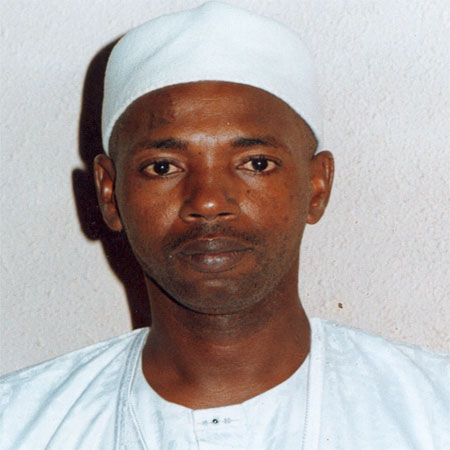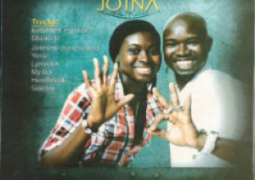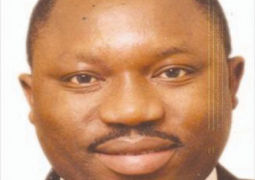
In what seems to be a rather interesting move, Hamat N.K. Bah, leader of the opposition National Reconciliation Party (NRP), has announced that he will contest the forthcoming Presidential Election in 2011 as a candidate himself.
Mr Bah, who lost the contest for the Presidential elections on two occassions (in 1996 and 2001), made the announcement yesterday during a press briefing held at the NRP bureau in
The briefing, which centered on Hamat Bah’s New Year message to Gambians, also covered pertinent issues ranging from the possibilities of an opposition alliance ahead of the 2011 polls, the country’s economy, the division within the opposition camp, the need for a national conference of all stakeholders, to the political impasse in
Bah, who threw his weight behind the UDP in the 2006 elections, also dwelt on issues pertaining the registration of non-Gambians in elections, and Iran-Gambia relations.
According to the NRP leader, he will be a candidate in the 2011 Presidential election, and will not be in any opposition alliance with anybody, where he will be led into an election; instead will lead his party into the 2011 election.
“I will not be a party to any opposition alliance in the coming election, but I will be a candidate in it. I will be a Presidential candidate and my name will be on the ballot boxes come the 2011 election.
“I’m not interested in any opposition alliance, because I have invested so much efforts into a political alliance and I have realized that the partnership of calling an opposition alliance in this country is not genuine, and I don’t want to be in any situation that is not genuine. There is more hatred; there is a lot of hatred within the opposition circles than outsiders may think,” he said.
For the benefit of the readers, we reproduce verbatim the full text of Hamat Bah’s statement:
It is a tradition that at the end of each year, we give out a goodwill message to the people of the
“It was a difficult year for Gambians and The Gambia, and we must all accept and acknowledge that the numerous problems we encountered, including the economic aspect, has been among the most difficult we have so far gone through since independence.
We also believe that some of these difficulties will still continue in 2011. Some of them were beyond our control, as a country and as a nation, for that matter, because they are related to the economic crisis that has engulfed the world at large. Some were also problems that were peculiar to this country, and that is why we needed to strategize, and take on 2011 differently, as we did in 2010.
First of all, on the political calendar, 2011 will be the busiest year for the last five years, because we are going to face a general voter registration, which is a constitutional requirement. Every Gambian will be issued a voter’s card, and that is a huge task for us all.
The NRP will, no doubt, participate fully in that process, as widely as possible and as extensively as possible. We had a meeting with the IEC this week to discuss the issue of the coming voter registration and, of course, our party convention, which we are planning to have sometime in May or June 2011. The IEC would, hopefully, by end of April have completed the voter registration, because we believe that it is going to be a difficult year, very intensive because parties will be occupied throughout the year.
At the end of the voter registration again, we are going to prepare for the Presidential Election, which we also hope will be in the last quarter of 2011. Let me also make it categorically clear that, by the grace of God the Almighty, I will be a candidate in that election, and I will not be in any opposition alliance with anybody, where I will be led into an election. Instead, I will lead an election.
To summarize that, let me put it in this way. That I will not be a party to any opposition alliance in the coming election, but I will be a candidate in it. I will be a Presidential candidate, and my name will be on the ballot boxes, come the 2011 election.
Let me repeat that, and make it abundantly clear for everybody to hear, and I hope that would clear the doubts left in the minds of some people, who do not believe in the statement I made at Soma during the UDP congress, and the ones I made to the press during my previous interviews. I want to repeat it again, and say that I will, by the grace of God, be a candidate in the coming Presidential Election. That is absolutely clear.
I’m not interested in any opposition alliance, because I have invested so much efforts into a political alliance, and I have realized that the partnership of calling an opposition alliance in this country is not genuine, and I don’t want to be in any situation that is not genuine.
There is more hatred; there is a lot of hatred within the opposition circles than outsiders may think. I don’t want to be in a situation that is not real. I don’t want to be a party to something where we can sit at a table and discuss when you have a knife, and you can cut my head. I don’t want to be a party to anything like that. For me, forget it. It is as simple as that. I am not interested at all, and that is the truth. It’s not what you want to hear, but it’s the truth.
If you know that this party is the biggest opposition party; they have the majority, why do you want to talk about another means of selecting a leader. We know that UDP is the biggest opposition party here. Ousainou Darboe will never go and follow somebody else with his party. So why are people talking about other means of selecting a leader. It’s all out of insincerity as far as I am concerned. I don’t want to be a party to that, and it’s simple.
On the other side is the elections vis-à-vis the IEC. NRP as a party is concerned about the issue of registration of non-Gambians, and we want to advise all Gambians to desist from getting foreigners to register in this country. It has serious ramifications, because you can register a person to vote for you to elect you into office, but the implications can be dangerous. If you give foreigners your national documents, you cannot control what those foreigners are doing outside, after the election. And whatever they do, if they are caught with these documents, the blame comes on us as Gambians.
We must also avoid empowering foreigners too much in this country, because we have seen examples in
We are not anti-foreigners. They are welcomed to come and participate in our national development, but they should not participate in the political process of this country. We must curtail it somewhere. This is our country, and we should preserve and protect its integrity. It is rather unfortunate that when you leave your country to go that way, in the next 15 to 20 years time, you will not be able to control or stop those people from doing what they want. And you will end up losing your whole country to people whom you considered as foreigners, but you made them citizens.
I want to advise players in the political field to avoid doing this, because it is dangerous, and has serious ramifications that can run this country into trouble. We should all be unanimous and committed in this, and work on it as political parties, and as citizens. We should protect our national documents, because that has nothing to do with foreigners. We have nothing against them. They are highly welcomed in this country to participate in national development. We are not an island of our own, but we must control what is controllable. That is a very important element in the coming voter registration, and I believe even the journalists should be empowered so that they can get more people to represent them in every registration centre. They should be given the support to be in every polling station. That is an area we all have to work on as partners. With that, we hope we will get a very strong voter register, which is credible, which can deliver results that will be acceptable to every political party.
On the economy, we all know that the economic situation has not been one of the best. There is massive unemployment, companies are going burst because business is bad, and every part of the economy is feeling it now. The rate of unemployment is growing very fast, with government not being able to absorb the people because the resources are not there. Companies, as I said, are dying by the day.
There is the need for us, as a nation, to convene a national conference before the end of the first second quarter of the new year, to discuss the way forward, where every Gambian will be given the opportunity to contribute his quota as to how we move forward this country, with a view to making it possible for every citizen of this country to be engaged in one way or the other, particularly the youth. We should give them the chance to secure jobs for them to participate in national development.
It can no longer be a one man show or one party or one man system. It has to be a system for the entire
When you reach a situation where people are hungry and angry, it is always difficult to manage them, and time is running out.
We need to start talking now, we need to engage each other across the board to discuss issues in this country, and draw conclusions that will get us out of the situation we find ourselves in. It has been made clear that 90 percent of our budgeted income would be generated from taxation, and that is almost impossible. There will be a huge budget deficit, and there will be huge local borrowing at the end of the day. So to avoid such a situation, we need to start doing something now.
With this conference, we can discuss all sectors of the economy and come out with a document that we will use as a country. The earlier we get on to that, the better, because we cannot succeed under the current situation, which is not sustainable, and cannot work.
I also want to suggest that, during this conference, the Commonwealth and the UN are important bodies that need to be drawn into a situation like this, to support us to make sure that we have a successful national dialogue.
It is rather unfortunate that, today, we live in a situation where Gambians are less informed of what is happening with their government. We get more news outside about our government than we get at the local level. These are some of the issues that we need to address.
Until today, the
“When people are hungry and angry, no amount of guns, no amount of weapons can stop them. The only way forward for us now is for us to sit down, and discuss this issue at a national conference, where all of us will sit down, and have a say.
On
Fortunately, this time around, the world is saying ‘No! we are not going to accept it’, and that has discredited some of these courts, with the exception of
Therefore, as opposition members, we must start looking for political solutions to our problems, and not legal solutions; because we cannot afford to continue using the system, whilst some of them are not reliable. What you get is not what you deserve. The current situation in
The judicial system is the referee in a democracy, and where that system is discredited, you have no genuine democracy, and
We have to draw the line somewhere now and say, ‘stop it!’ If the judiciary is not doing its job as a proper referee in a democracy, there is no way we can guarantee elections free of violence; elections that are free and fair, because we rely only on the judiciary. What we need now is political solutions to political problems, and that must be something that we must all take into account.
On that note, I wish all Gambians a happy New Year and a successful 2011 voter registration, Presidential Election, and also successful endeavours in their various walks of life.



